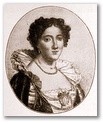Met's Armida by Rossini Live in HD May 1
Renee Fleming as the Wicked Sorceress
By: Susan Hall - Apr 22, 2010
Armida
by Gioachino Rossini
Conductor, Riccardo Frizza
Production, Mary Zimmerman
Set & Costume Designer, Richard Hudson
Lighting Director, Brian MacDevitt
Choreographer, Graciela Daniele
Goffredo, John Osborn
Eustazio, Yeghishe Manucharyan
Armida, Renee Fleming
Idraote, Peter Volpe
Gernando, Jose Manuel Zapata
Rinaldo, Lawrence Brownlee
Astarotte, Keith Miller
Ubaldo, Kobie van Rensburg
Carlo, Barry Banks
Metropolitan Opera
New York
April 19, 2010
Performances through May 15th
212-362-6000
Armida will arrive at your local movie theater in HD on May 1. Your eyes will be awash in color, beautiful blacks and reds, an intoxicating robin’s egg blue, and diva Renee Fleming in cerise. The colors of the singers’ voices also entrance. Tenor Barry Banks is taking on two of the roles, as he sings both Carlo and Gernando.
Gioachino Rossini’s first Neapolitan opera was written for the love of his life, a contralto turned soprano, Isabella Colbran. Her voice easily spanned three octaves. She was the mistress of the manager of the San Carlo opera house when Rossini seduced her with the Armida role, then married her, but dumped her after a disastrous performance as Zelmira in London. They legally separated and she was in the care of his father until she died. Colbran composed four volumes of songs along the way. Their story leaves no question about the kind of personality attracted to the operatic form.
Here’s the Armida plot based on the Torquato Tasso poem, Jerusalem Delivered. A bewitching sorceress, Armida, falls for a crusader, Rinaldo, and captivates him. She entices him to her garden of delights. Two other crusaders arrive and when Rinaldo looks at his image reflected in his shield, he is repulsed and agrees to go back to the Crusades. The sorceress destroys her palace and twirls in fury as she vows revenge. No suicides or death by tuberculosis here.
This tale was made into operas by Handel, Haydn, Dvorak among others. JS Bach’s youngest son JC wrote a cantata based on Armida’s story. It may be the most often told story in opera, but was not put on at the Met for 193 years, perhaps because casting is difficult.
Rossini was one of the first composers to not only look back to the antico singing style, but to incorporate emotion into the arias, duets and trios he composed. He loved the ‘cantare che nell’anima sente’ (music for the soul) of the castrati tradition, but was undoubtedly grateful that castratis went out of fashion. He had started life as a singer. An uncle wanted him castrated, but his mother intervened.
Rossini wrote of the castrati voices, “The purity, the miraculous flexibility...and profoundly penetrating accent…moved me more than I can tell you.” On stage in Armida six tenors, all Crusaders, demonstrate Rossini’s prized qualities, particularly Jose Manual Zapata, and Barry Banks. Conducted by Riccardo Frizza, the music is delightful.
Even Richard Wagner interviewed Rossini, the master, on the subject of singing and singers. The sfogato voice, light and unrestrained, has always been a delight, and Fleming displays hers in this role. She sang the “Pour Mi” Messiaen song cycle at the opening of the New York Philharmonic in the fall, and was stunning in these difficult but beautiful three octave pieces which demand richness and brilliance of tone.
Armida is written for a plangent sound, loud and resounding. We don’t get it in the two principals. The lead tenor, Lawrence Brownlee, has a voice that perfectly matches Fleming’s, eminently musical, lovely lines, but small. Their one-an-act duets which don’t have to compete for attention with either the orchestra or chorus are enchanting. If Fleming and Brownlee don’t have sufficient power and brilliance for an opera house, they will be just fine in the up close HD where talented directors often correct the problems of performance in the house. Some of the singers’ awkward movements will also be overcome in the HD.
Moments to watch for because they are such fun include the singing of bass/baritone Keith Miller who is hoisted aloft by dancers and performs his second act aria comfortably swimming through air. This is some hoist. In another life, Miller played football for the Colorado Buffaloes. He is a singer to track.
The second act dance designed by Graciela Daniele is witty and charming. Don’t be put off by a few signs posted during the performance, or the figures of cupid and evil, who sometimes paw at performers while they sing.
The director Mary Zimmerman has given us a not so subtle hint that power is fun. Fleming often displays the dominatrix in Armida. Kinky is in at the Met this year -- Tosca and Lulu come immediately to mind.
If you love the tenor voice, a glamorous and entertaining production and Ms. Fleming, this is the show for you. When the Pesaro musical festival opened in 1818, Rossini hoped to bring Colbran in Armida which had just been mounted in Naples. He failed. Some two centuries later, Renee Fleming’s brilliant performance as Armida in Pesaro launched her career. You can see why on May 1.
Armida is at neighborhood theaters on May 1 (US and Canada). Encores: US May 19; Canada May 22.





